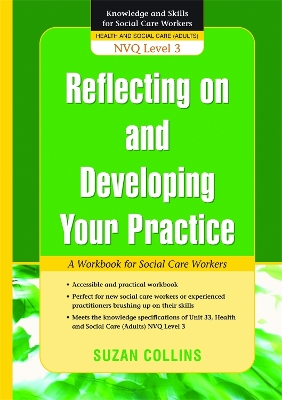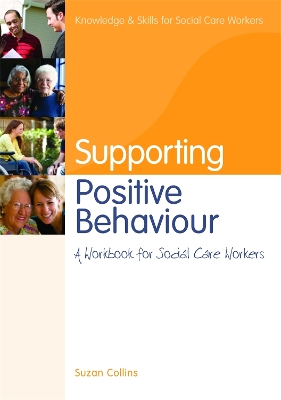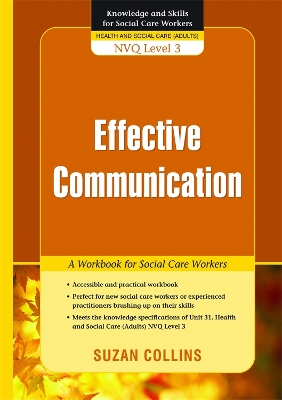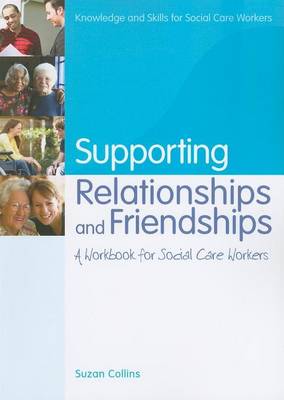Knowledge and Skills for Social Care Workers
6 total works
Working in residential or domiciliary settings involves a continuing process of learning. Every day, social care workers face challenges that force them to think about what they do and how they do it – whether it be an ethical dilemma, the introduction of a new policy or procedure or training on a specific subject.
Reflecting On and Developing Your Practice is an accessible, interactive workbook providing social care workers with guidance on how to improve your knowledge through training and development. It advises how to keep up to date with the latest developments, but also how to reflect and improve upon your own practice. It also provides information about different approaches to learning and how to draw on your experience when working in new and unfamiliar situations.
Designed to meet the requirements of Health and Social Care (Adults) NVQ Level 3, Unit 33, this workbook is also a valuable source of guidance for any social care worker wanting and needing to develop their work.
Communication problems, frustration and boredom can manifest themselves in physical outbursts, and working in a residential or domiciliary setting can involve responding to challenging behaviour towards staff and other residents.
Supporting Positive Behaviour examines the underlying reasons for the behaviour, ways to spot challenges before they occur and strategies to minimise or prevent incidents. This interactive workbook will help staff to understand appropriate interventions, how to monitor and record challenging behaviour, and implement strategies that will reduce the behaviours over time. The book is appropriate for all staff supporting people with mental health needs, people with a learning or physical disability, older people and people with dementia.
This workbook is a valuable source of guidance for any social care worker keen to improve their practice, and represents a cost-effective way for managers or trainers in residential and domiciliary settings to train staff.
Social care workers in residential or domiciliary settings need to be able to communicate effectively in order to carry out their work.
Supporting people with a variety of difficulties including hearing loss, impaired speech, visual impairment, dementia and physical and learning disabilities requires a range of communication skills, such as listening, sign language, writing notes, and using body language, touch and stimulation. This workbook will provide workers with the ability to enable adults with limited or no verbal communication skills to make decisions, and to express their views in their preferred method of communication.
Effective Communication includes practical guidance on using communication tools, such as computers, staff photo rota boards and pictorial menu boards, and use of photographs as visual reminders. The workbook meets the requirements of care standards and also refers to the importance of recording and reporting, and dealing with sensitive and complex issues, such as breaking the news of a family bereavement, or communicating with a person who has been abused.
Designed to meet the requirements of Health and Social Care (Adults) NVQ Level 3, Unit 31, this workbook is also a valuable source of guidance for any social care worker wanting to improve communication with the people they support.
Working in residential or domiciliary settings involves a responsibility to safeguard adults from harm and abuse. This workbook will provide staff and relatives with the ability to make sensible choices concerning prevention and protection, as well as responding to and reporting concerns.
Safeguarding Adults examines the different forms of abuse, where abuse can take place and how and where to report the suspected abuse. The workbook meets the requirements of care standards and promotes best practice by enabling staff to feel confident contributing to keeping the people they support safe from harm and abuse.
Designed to meet the requirements of Health and Social Care (Adults) NVQ Level 3, Unit 35, this workbook is also a valuable source of guidance for any social care worker wanting or needing to improve their practice in relation to safeguarding adults from harm and abuse.
Those working in residential or domiciliary settings have a responsibility to maintain a clean, safe and secure work environment.
Health and Safety provides guidance on the responsibilities and risk assessments involved, covering subjects such as first aid, safety in the kitchen, infection control, safe handling of adults, issues surrounding medication, how to react in an emergency and how to respond to challenging behaviour. The workbook meets the requirements of care standards and promotes best practice by enabling staff to gain the knowledge needed to meet health and safety standards.
Designed to meet the requirements of Health and Social Care (Adults) NVQ Level 3, Unit 32, this workbook is also a valuable source of guidance for any social care worker wanting to improve their knowledge.
Supporting Relationships and Friendships looks at how to assess social skills and the qualities needed in a friend. Sharing interests can provide companionship and promote self-esteem, but some relationships and friendships can become negative or burdensome, and this book offers useful guidance on supporting service users in managing these relationships. The book is appropriate for all staff supporting people with mental health needs, people with a learning or physical disability, older people and people with dementia.
This workbook is a valuable source of guidance for any social care worker keen to improve their practice, and represents a cost-effective way for managers or trainers in residential and domiciliary settings to train staff.




